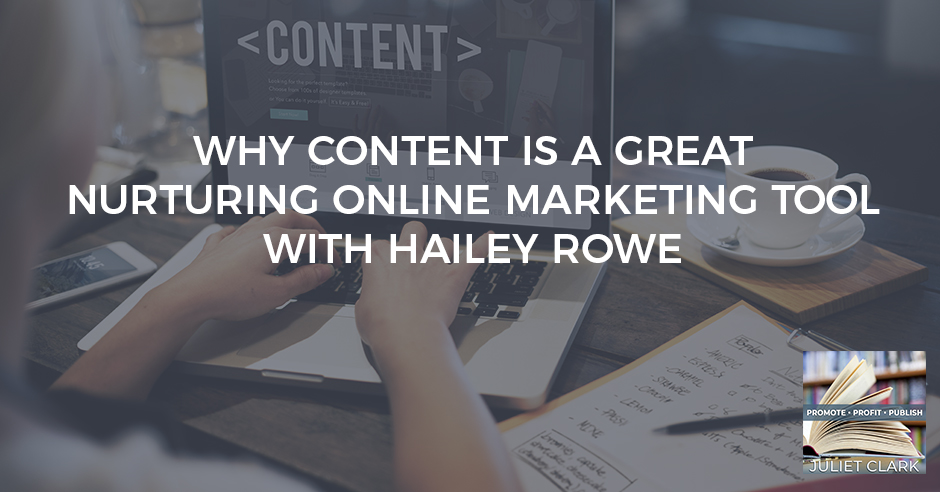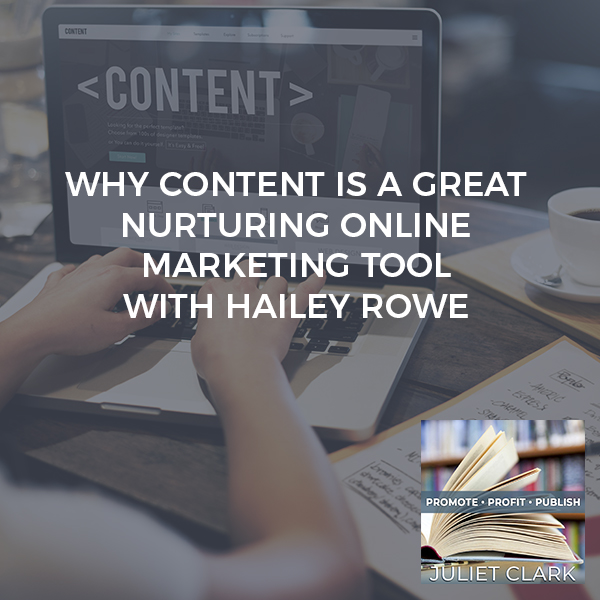
There is too much talk about how to make your content better but less about why we need to make it better. Getting to the root of it, Juliet Clark interviews marketing and sales strategist, behavioral change specialist, human potential coach, and host of the Health Coach Nation podcast, Hailey Rowe. Here, Hailey explains why content is a great nurturing tool that can take somebody from being a stranger to forming a relationship with them. Sharing her business marketing and mindset tips in her Facebook group, she also emphasizes the power of content to bring people together. She then shares the ways you can effectively use your content to nurture relationships with your audience or followers. Plus, Hailey also taps into online marketing, sharing the trends across Facebook, LinkedIn, and Instagram that could help you leverage content better and more.
—
Watch the episode here
Listen to the podcast here
Why Content Is A Great Nurturing Online Marketing Tool With Hailey Rowe
We have a great guest. I know I always say that but we’re going to talk about something a little bit different, nurturing your content. Before we get started, I want to remind you to go over to YouTube. Follow us on Super Brand Publishing. Subscribe and you can see all the videos of all these interviews over there. Also, don’t forget to take our Promote, Profit, Publish Quiz. You can find that at www.PromoteProfitPublishQuiz.com.
Our guest is Hailey Rowe. She is a marketing and sales strategist for online service providers who want to gain more clients online consistently, grow their business to full time, and rock their sales without self-doubt. She shares her business marketing and mindset tips in her Health Coach Nation podcast and in the Health Coach Nation Facebook group. Since 2010, Hailey has worked in the coaching industry as well as in business development and marketing for several wellness companies and startups. She’s also a certified behavioral change specialist and a human potential coach. Hailey’s philosophy is you can have amazing service and impact to make, but without a strong mindset and sales and marketing plan, your business will remain a hobby. That is absolutely true, Hailey, and welcome.
Thank you. I’m excited to be here.
I’m excited to have you because we talk a lot about content on here but people don’t often understand why it is such a great nurturing tool. Can you speak to that?
Content is great because it takes somebody from being a stranger coming to your profile to feeling like, “I know this person.” The know, like, and trust factor in marketing. It also helps somebody feel a part of something. With my content and with my Facebook community, we all are a tribe and we all are trying to make the world a healthier and happier place because I’m helping health coaches, life coaches, and mindset coaches keep their jobs and make their impact and book clients. What it does is it unifies everybody. It shows what you stand for. It can weed out people who aren’t meant to be in your audience or a client and it can be a magnet for the people who are right for your offer.
You and I had that discussion that you have a way of doing that, and we do it with the quiz but it is important. I want to go back to what I said about part-time because I found this out when I first started my publishing company and when I had clients starting to come on. Until you learn internet marketing, you’re going to be part-time. It’s an integral part of that. In my opinion, it’s not something that you can just hire a company and say, “Go do it.” You need to understand it.
Especially if your business is under $10,000 per month, those are the things that are going to help you grow this. Even though I work with a lot of people that say, “I want to be good at what I do. I want to work with my clients.” I say, “Are you going to hire out all the sales marketing, or are you going to learn it yourself first, do it, and grow it, and then hire people?” You do have to make that choice. That’s a trade-off.
When you hire a marketing company, a lot of times, people always blame the marketing company for the failure. “It was the marketing company that did it,” but truly the failure behind a lot of this is if you don’t have a thorough understanding of what they’re doing, your message, and your audience before you hire them. A lot of times, they can’t bridge that gap. You have to be confident about what you’re doing to relay that to them.
That’s why my philosophy is the same as that. I agree that you should learn it first, know what metrics to look for, know how long it truly takes, etc. before going to somebody and expecting them to do it because then it’s a better way of protecting yourself.
There’s a big word right there, expectations. A lot of times, when people hire a marketing company, they expect to see instant results and you don’t always get that.
It depends on the strategy you’re choosing. There are long-term strategies and there are short-term strategies. The long-term strategies sit there, accumulate leads, and work for you in the long run without you being there. The short-term strategies are things like, “I’m doing outreach on social media. I’m going to go live today,” or whatever it is. You need to have a balance of both but I agree that sometimes it can take up to three months with some of those long-term strategies.
I’ll give another example. Like being on a podcast, in my mind is a long-term strategy because it sits there and it gets good SEO. I’ve had people say, “I heard you on a podcast 1.5 years ago.” Now here I am, I’m ready to work with you. Making sure that when it comes to expectations, define, is this the thing that is a long-term strategy, that will pay off, it’s passive, and it sits there? Is this an active short-term strategy? Make sure you’re diversifying between both.
Don't let things stop you or paralyze you from starting podcasts. Share on XThat brings up a good point. A lot of people start podcasts because they think it’s an instant gratification tool and podfading where you start one and then they die. Typically, the average podcaster doesn’t even get to 25 episodes.
I heard of the stats. It’s crazy.
When Hailey says a long-term strategy, when I have a client who starts one, I tell him, “You’re minimum.” You can’t even begin to build the audience around that until it’s been there for a year. Do you think it’s a year or longer than a year? What are your thoughts on that? You have a podcast. You’ve had yours for longer than I’ve had mine.
I’ve started the podcast in late 2017, probably December. In the beginning, it was unclear about what my strategy was behind it. It was inconsistent and it was overall bad. I was like, “I’m going to throw this out there. This would be great. I want to talk to cool people and that’s much why I’m doing it.” I wanted an excuse to interview people. Honestly, 2020 has been my most consistent, clear, and strategized year with my podcast. It’s gotten better as far as the results. Meaning, people saying, “I love your podcast. I listen to your podcast.”
My thought is you don’t have to be perfect. It did help me that I had it sitting there for a little bit of time before I went all in and more perfect, but I’m still not perfect. I would say, don’t let things stop you or paralyze you from starting podcasts, but at the same time, go in knowing your clear intentions, being committed to it for the long term, and making sure that it makes sense for your priorities. As far as the time length, it depends because if you’re not doing anything to promote it and you’re just putting it out there, good luck. If you’re also repurposing it on social media, having big guests on there, and getting tons of reviews, then it can grow quickly.
We are a couple of years out. We have 104 episodes to choose from. I’m able to post on social media three days a week with either brand-new content or older content and you can see the results of that. We’ve gone up 30% in our audience this year. It truly is something you have to commit to over the long haul. What are you seeing with COVID? I’m seeing all of these businesses that were online that are thriving, and then I’m seeing the people who got shut down. All of a sudden, they have to go online and they had no idea it was this hard. Are you seeing the same thing?
Yeah. I agree with you. I’m seeing a lot of online businesses explode. I work with a lot of health coaches and some of them with their products and stuff during COVID like essential oils and CBD. They’re doing well and they’ve sold a lot of health coaching packages because a lot of people are like, “I’m home. I don’t have a gym anymore. I need help. I’m eating everything.” Those have been good for some people, but as far as the local businesses, it is hard. What would we do as online businesses if the same thing happened with the internet? If the internet went down for three weeks? Nobody is safe but at the same time, being online is a good thing.
There’s a quote from Warren Buffett that’s like, “Only when the tide goes out do you discover who’s been swimming naked.” What’s happened with the whole COVID thing is we figured out, “Retail and local things have been going down a little bit here and there.” Not all of them but trends. A lot of things are shifting online. When the COVID hit, the tide went out. A lot of people were caught swimming naked with no backup plan and no online presence. A lot of people are rushing to try to create that and try to get that going. It’s a good thing. It is unfortunate, but all this has happened.
I would think of health care, I can see why it’s booming because when I see it on TV, I’m talking about COVID, nobody ever says, “You, high-risk people, it’s time to lose weight. It’s time to eat better. You’re going to die.” They’ve got this hype going and not the healthy way through all of this, which irks me. What are you saying trend-wise with everything out there in the marketing world? What’s working these days and what’s not?
It depends on your business and your ideal clients. For me personally, what works best for me is LinkedIn lead generation, my Instagram and interacting with my followers and creating an engaging community there, and then my Facebook community. The reason that I say that is because first, my Facebook group is a central location. It’s where I send everyone and it’s where I do the most things. They all work together but they all go to one place.
What works is finding, number one, where would your ideal client be watching you? Number two, how can I simplify things for myself? If you’re doing this by yourself or you don’t have a ton of teammates, you can be on every platform going all in and it’s easy to share posts from platform to platform, so I would say, do it if you can. At the same time, I’m all about double down on what works and where you’re going to show up and be consistent. For me, that’s my Facebook group and that’s the main thing.
People are always mystified when I ask them to open up a Facebook group about, “What am I going to post?” This is where the content comes into place because when you tell them, “You’re going to put valuable tips. You’re going to do things inside of there that create community,” they die. They’re like, “How do I do that?” What do you provide for your community content-wise in the group that is engaging?

Content Marketing: Content is great because it takes somebody from being a stranger coming to your profile to feeling like they know you.
A Facebook group is what we call a long-term strategy where the first year, it was dead and it was small. It’s all good, but you’ve got to keep showing up there. What I post on my Facebook group are a couple of different things. First, let’s start with a framework. Think about, what do you want your ideal client to know before they work with you? Do they need to know that they have a problem? Do they need to know that this certain excuse or objection that they keep holding on to isn’t serving them? Do they need to know a certain piece of educational information that’s going to inspire them to reach out to you? What do they need to know?
The second thing you want to ask yourself is what do I want them to be doing? Do I want them to be booking a call with me? Do I want them to be nurtured on my email list? What’s the goal here to capture the lead and move them into the conversion stage? Also, what do I want them to be doing to see wins from my group? Do I want them to come to my lives and ask questions? Do I want them to fill out a workbook that I made for them this week? Figure that out as well because when you give them small wins and good experience in your group, that’s going to be beneficial and they’re going to remember that.
What do I want them to know? What do I want them to do? The last part is, how do I want them to feel? That’s important because as we know, our buying decisions are emotionally-based a lot of the time and it’s all about community. That’s what Facebook groups are all about. I want them to feel excited to be there. I want them to feel like they’re getting value from the group. I want them to feel excited about the content in there and things like that. When we break that down more to what that might look like for a week, for the feelings, things like what gets the most engagement? Honestly, the least amount of work, which is crazy like using a colored background, which you can do on Facebook, and writing a short question like, “What are your goals this week?” “I would have more business success if I,” fill in the blank.
Conversations with people, nurture them, and give them a resource if you have old podcasts on something that they said. Maybe they said their goal is, “I want to launch my program this month,” and you have a podcast about launching. You’ll be like, “That’s awesome. This might help. Check it out. Let me know if you have any questions. When is the launch?” You get that conversation started. That’s the first piece. The second piece with feelings is storytelling posts. Sharing a story about a client’s transformation or maybe interviewing a client as social proof. Maybe sharing something you’re struggling with and what you did to fix it. Things people can relate to and that kind of thing.
When it comes to, what do you want them to do? You can have calls to action in your group. Maybe give valuable tips. They start out with a catchy headline and they give a couple of quick tips or something that can give your ideal client a small win. At the bottom, they say, “By the way, if you want the rest of the three tips, sign up for the free three tip guide in the link in the comments,” or something that says book a call. That’s the do part. The last part is, what do you want them to know? Those would be posts that are written posts or video posts where you’re overcoming objections, but in a storytelling way or in your personal story type of way. That’s also where you’re educating, so you’re doing your lives and things like that.
Overall, if I was going to break down the types of posts, you’d have your color background question posts that are engagement-based, question-based, or short talk-to-me-based. You’d have your knowledge types of posts. What do you want them to know? You’d have your storytelling and feeling types of posts. You’d have objection busting types of posts and you’d have a social proof as well. You’d have a few promo posts in there. It is important to say what do you even do in there.
She gave you a content calendar that you can rinse and repeat. Every day of the week, Monday through Friday, do one of those things and do it consistently. That’s what brings people in. I also want to address, she mentioned in there CTA. I’ve told you the story before. You have to be able to transition people out of social media and onto your list because what if Facebook were gone tomorrow? Hailey, I’ll tell this story. I had a friend who had a huge following on Myspace. Are you even old enough to remember Myspace?
Yeah. I don’t know how to delete my Myspace. I don’t know the login.
I don’t even know if Myspace was still there. She had over 300,000 hits on a monthly newsletter. She had a glossy magazine. When everybody jumped over to Facebook, she lost her sponsors and most of her business because she didn’t make them opt-in. If she had made them opt-in, that call to action to get that list you were talking about, then she could have just written a series of emails. “Here’s our page. Find us here.” She would have not only been able to transition that but she would have been one of the first people over on Facebook generating business. You always have to do that. That’s important as part of this engaging process. In your Facebook group, how many lives do you do? People avoid lives. They don’t want to be on camera. How often do you do lives?
I’ll be honest, I’ve taken the summer. I’ve been doing lives, but much less than I used to. I used to go live almost maybe three times a week or sometimes daily if I’m in a big push period, and they’d be short sometimes. They’d be 5 to 15 minutes. To answer that, I’d say it’s at least once a week, and what I used to do as well is have a weekly time, so Tuesdays at 4:30 Central Time used to be my regular time. I need to probably start doing that again. People got into it, had a routine, and people expected it. That’s good if you can get into the habit of telling people when you’re going to be live and maybe doing the color background post of me like, “We’re going live in fifteen minutes. Ask your questions about length.” Consistency is best.
Tracy Hazzard and I had a Monday Marketing Mixer that we stopped because of the election. We don’t want to be on Facebook as much as we used to. The interesting thing is every time we jump on a phone, and we have a weekly call, we’re shocked at how many people are still liking the page and they’re watching the videos. We’re like, “How come these people never showed up at that time?” Because we used to get about 1,000 views a week and we’re still getting it. That’s another one of those things though that you have to build up over time and get them used to you being there. Other ideas, you use Instagram a lot. I’m not an Instagram user. How do you use Instagram in all of this?
I’m a big fan of IGTV and that’s something that Instagram pushes on to people’s more news feeds. The real question you should be asking when it comes to Instagram is, what kind of content is the most shareable and most stable? Meaning, people want to come back to it later and they click that little upside-down flag on Instagram to save your content and look at it. Those kinds of posts typically for me are like quote posts or something where I’m giving super juicy tips that they’ll need to look back at like a template or something.
LinkedIn is a place for networking. You're not out of place by connecting with somebody. Share on XThe IGTV, sometimes people will say, because they want to go back and watch it later, I use Instagram Stories as well but keep in mind that Instagram Stories, only about 2%-ish of your followers will watch your Stories on average. Don’t be afraid to have a consistent message on Instagram. Keep talking about your offer, and doing these things day after day because a lot of people don’t see it. Unless you’re lucky in the algorithm and you’re using ads and all that. I would say that it’s good to do Stories because a lot of people do that more than scrolling the feed and it’s good to have saveable and shareable posts.
You and I met over on LinkedIn. For me, LinkedIn is probably where most of my audience is that I had to learn it. I’ve had a couple of clients who are comfortable with Facebook and they don’t want to go put the work in on LinkedIn, even though their people are there. For you, was LinkedIn just a natural? I know Facebook was huge for fitness. Did you have to push it and learn it?
I did. I outsource that but I learned how it works and that kind of thing. I’m a big fan of using Sales Navigator and trying to find your ideal client and connect and build. What I like about LinkedIn is it is a place for networking. You’re not out of place by connecting with somebody. You’re not out of place by saying, “I would love to learn more about you.” It’s not weird. I also love the statistics about LinkedIn as far as people are more ready to buy. Their average income is higher, and it’s less saturated. I’m sure it’s gotten more saturated, but it is less saturated than Facebook and Instagram. I’m a big fan and I like connecting with people and sometimes, having a networking call. That’s how we book this podcast. It’s a great tool.
I use something a little bit more automated with LinkedIn but it doesn’t seem weird. I’ll tell you a funny story. When my coach started having me use the automation, my first thing was, “I hate that.” He had me use a message that was non-salesy and every once in a while, I get a jerk but most of the people are super nice. You’re right. It’s not weird to reach out. Here’s one thing I’m hating. Are you seeing this a lot too? I don’t know who out there is teaching a particular message but I get the same message from ten people in one day. Do you do that?
No.
It’s like, “I noticed your profile.” It’s word per word. There’s some coach out there teaching it and I don’t think they understand when you see it over and over. I almost want to write back sometimes when I’m in a smart-aleck mood like, “What was it about my profile?” Whatever you do, you have to be genuine in that reach.
Here’s the thing. I agree. At some point, you’ve got to automate it, and then you’re answering the messages or you’ve got a teammate in answering them, so that’s okay. I don’t know about everybody else but I’m not offended when I get a copy-paste message. It’s fine. I’ll either not answer if I’m not interested or say, “I get this all the time. I know what you’re doing. I’m a business owner too. Good luck.” I’ve gotten those messages too, that are snarky like, “I’m not looking for any services.” Meanwhile, I said nothing about my services. I was like, “Great to connect. I’d love to hear more about you. What are you excited about these days?” I agree with making the message short, making it genuine as you can, and then answering it yourself and not being offended if somebody is like, “I hate when I’m getting messages.”
I have a small video in mind, but I’m looking for pod swaps. That’s the whole point and that’s how we met. I don’t do anything salesy in it. It’s just, “This is what I’m looking for. Here’s a short video about what I do.” The video is not meant to be salesy. It’s meant to be, “Before you can say yes to the pod swap, you need to know if I’m a good guest for your show.” That’s a key point of that, don’t go selling. I see a lot of financial planners and CPAs go right in and it’s a sale. It’s like, “I don’t know you. I don’t want to talk about my finances with you.”
It’s a stranger on the internet.
That’s almost worse than the guy looking for a date from Algeria. My $3 million is in Africa waiting for me to sign up.
You’re missing out.
This has been great. Do you have something you’d like to give us? Where can we find you?

Content Marketing: When the COVID hit, the tide went out. A lot of people were caught swimming naked with no backup plan and no online presence.
I have a podcast as well. It’s called Health Coach Nation. I have the Health Coach Nation Facebook group. I’m at HaileyRowe.com and on that website, there are two free things. There is my Free Niche Marketing and Instagram Bio Checklist training. There’s also a free strategy call opportunity. If you want to talk about your business, you can do that. I’m on Instagram @Hailey_Rowe and Facebook page. I’m everywhere. It’s all good.
Thank you for being on. This is great.
Thank you.
Important Links
- Super Brand Publishing
- www.PromoteProfitPublishQuiz.com
- Health Coach Nation
- Health Coach Nation – Facebook group
- LinkedIn – Hailey Rowe
- Instagram – Sales & Marketing Strategist
- Monday Marketing Mixer
- HaileyRowe.com
- @Hailey_Rowe – Sales & Marketing Strategist
- Facebook – Hailey Rowe
- https://www.HaileyRowe.com/consistency
- https://Calendly.com/haileyrowe-coach/30min
About Hailey `Rowe

Love the show? Subscribe, rate, review, and share!









Leave A Comment